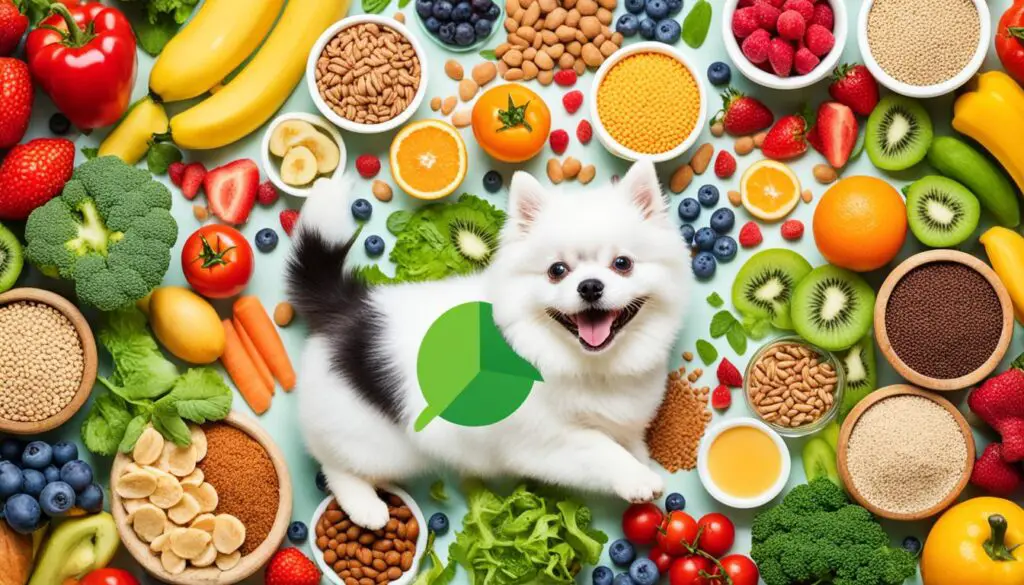Being a pet owner means I know how crucial it is to look after my pet’s health. Just like us, pets require care to stay happy and live long. In this piece, I’ll share key pet care tips that will keep your friend healthy.
Scheduling regular vet check-ups is crucial. These visits help spot any health issues early and talk about shots. Your vet can offer great advice and listen to your worries about your pet.
Providing the right food is essential too. Check your pet’s diet and ask your vet if it’s good for them. Good pet food and occasional healthy treats are essential for their well-being.
Giving your pet regular exercise is vital for their body and mind. Set up a daily exercise plan that fits their needs. This helps with their weight, heart health, and keeps bad behaviors at bay.
Mental play is as important as physical activity. Use puzzles, games, and new places to keep them sharp and avoid boredom.
Managing your pet’s weight is critical, especially if they’re overweight. Your vet can help you with a diet and exercise plan to get them back in shape.
Dental care matters a lot. Remember to brush their teeth, offer dental treats, and possibly get professional teeth cleanings to avoid dental problems.
Grooming is not just for looks; it’s healthy too. Regular brushing, ear checks, and nail trims are important for their well-being.
Keep your pet’s ID and microchip details current. This is a simple step that can make a big difference if they ever go missing.
Key Takeaways:
- Regular vet check-ups are key for your pet’s health and catching issues early.
- Feeding them a balanced diet with quality food and treats is vital.
- Exercise and mental challenges are important for their health.
- Managing weight, dental care, and grooming are all part of keeping them healthy.
- Keep your pet’s ID and microchip info updated to help find them if lost.
The Importance of a Balanced Diet and Routine Veterinary Check-ups
It’s key to feed your pet well to keep them healthy and happy. Feed them a balanced diet rather than table scraps. Nutritional pet food is best, and remember to choose what fits your pet’s needs.
Always provide fresh water for your pet. This keeps them from getting dehydrated, especially if they eat dry food. You might want to add some wet food too for extra hydration.
Some pets need special food because they have allergies or health issues. These special diets are important for their health and can save you money. Talk to your vet to find the best food for your furry friend.
Regular check-ups with the vet are as important for pets as they are for people. These visits can catch health problems early. Most pets should see the vet once a year; older pets or those with health issues might need more visits.
During these check-ups, your vet can give your pet shots and check their health. They will also suggest the best food for your pet. This could include a special diet if your pet needs it.
The Benefits of a Balanced Diet:
- Promotes overall pet health and well-being
- Provides essential nutrients for growth and maintenance
- Helps maintain a healthy weight
- Supports a strong immune system
- Aids in digestion and promotes gut health
- Contributes to a shiny coat and healthy skin
| Nutritional Requirements | Types of Food to Include | Types of Food to Avoid |
|---|---|---|
| Protein | High-quality meat, fish, poultry | Excessive fatty meats, processed meats |
| Carbohydrates | Whole grains, vegetables, fruits | Refined grains, sugary treats |
| Fats | Healthy fats like fish oil, flaxseed oil | Unhealthy fats, excessive fat intake |
| Vitamins and Minerals | Fresh fruits, vegetables, supplements as recommended | Deficiency in essential vitamins and minerals |
A balanced diet, along with routine veterinary check-ups, is the foundation of preventive healthcare for pets.
Feeding your pet right and visiting the vet regularly are crucial steps. They ensure your pet stays healthy and happy. A healthy pet truly is a joyful pet!
Managing Pet Anxiety: Tips for a Calm Companion
Pets can get anxious, just like people. It’s key for pet owners to spot anxiety signs and know how to act. Signs include too much barking, wrecking things, eating less, not wanting to be around, and acting nervous.
Make your home a safe space with familiar things like toys and bedding. This helps your pet when they need a break. Sticking to a schedule for meals, play, and walks is also important. It makes pets feel safe and cuts down on stress.
Help your pet stay sharp and fit with games, toys, and training. This keeps them from getting too worried and is just good for them overall.
It’s good for pets to meet other people, animals, and see new places to help them not be scared.
There are special products made to calm pets, like pheromones, wraps, and sprays. You can also try giving them a gentle massage or playing calming music.
If the home remedies don’t work, your vet can help. They’ll check your pet and might suggest training or medicine to help with anxiety.
With the right steps, you can help your pet feel secure and happy in your home.
Conclusion (no SEO keywords)
Maintaining our pets’ health is vital for their happiness and well-being. We discussed key tips in this article. These include regular vet check-ups, a balanced diet, managing anxiety, and creating a pet-friendly space.
A balanced diet, regular vet visits, and addressing anxiety are crucial for their health. Every pet is different. It’s wise to talk with a vet for personalized care.
By focusing on our pets’ health and happiness, we strengthen our bond with them. This bond brings us joy for many years.
FAQ
Why are regular veterinary check-ups essential for a pet’s well-being?
Getting regular check-ups is key for your pet’s health. It helps catch any problems early. You can also discuss their shot schedule and any worries you have.
How can I ensure my pet is getting a balanced diet?
Make sure your pet’s diet is balanced by checking with a vet. They’ll suggest a good pet food for your pet’s needs. And, treat them with fresh, good snacks once in a while.
Why is daily exercise important for pets?
Exercise every day keeps pets healthy in body and mind. It helps keep them at a good weight and avoids problems like bad behavior. Set up a good workout plan based on your pet’s breed and health.
How can I provide mental stimulation for my pet?
Keep your pet happy by offering puzzle toys, games, and new places to explore. These things keep their mind sharp and make them feel good.
Why is weight management crucial for my pet?
Managing your pet’s weight is important for their health. Your vet can help make a plan if they’re too heavy. This plan might change what they eat, how much, and how often they exercise.
How can I take care of my pet’s dental health?
Take care of your pet’s teeth by brushing them often, giving them dental treats, or getting their teeth cleaned at the vet. This keeps their mouth healthy and free from disease.
How often should I groom my pet?
Grooming isn’t just for looks. It’s part of their good health. Brush their fur and check their ears and nails regularly.
Why is it important to update my pet’s identification and microchip information?
Updating your pet’s tags and microchips increases the chance of finding them if they get lost.
What should I feed my pet to ensure balanced nutrition?
Feed your pet good food and avoid table scraps. Choose food that’s right for their age, size, and health.
Why is it important for pets to have access to fresh water?
Pets need fresh water to stay hydrated, especially if they eat dry food. Wet food can also help keep them hydrated.
Do some pets require special diets?
Some pets need special diets for health reasons. These are recommended by a vet to keep your pet healthy and avoid costly trips to the vet later.
How often should I take my pet for a veterinary check-up?
Most pets need a check-up every year. But, some, like older pets or those with health issues, might need to see the vet more. During a check-up, they’ll get shots and a health check.
What are common signs of pet anxiety?
If your pet is anxious, they might bark a lot, chew things up, eat less, look worried, or not want to play.
How can I create a comfortable and secure environment for my pet?
To make your pet feel safe, give them familiar things like toys and a bed. These make a safe spot for them when they’re scared or stressed.
Are consistent routines important for reducing pet anxiety?
Yes, a regular schedule helps pets feel safe and calm. It makes them understand what’s coming next, which is comforting.
How can I provide mental and physical stimulation for my pet?
Keep your pet active and smart by playing with them, using puzzle toys, or teaching them new things. This makes them happy and healthy.
How can I help my pet socialize and build confidence?
Get your pet used to different places, people, and animals slowly. This helps them get braver and less scared.
Are there any products that can help alleviate pet anxiety?
Yes, there are items like pheromone products, wraps, and calming sprays that can relax your pet. Also, softly massage or play relaxing music for them.
What should I do if at-home strategies don’t alleviate my pet’s anxiety?
If your pet stays anxious, ask a vet for help. They can check for health issues and suggest special training or medicine to help your pet feel better.



